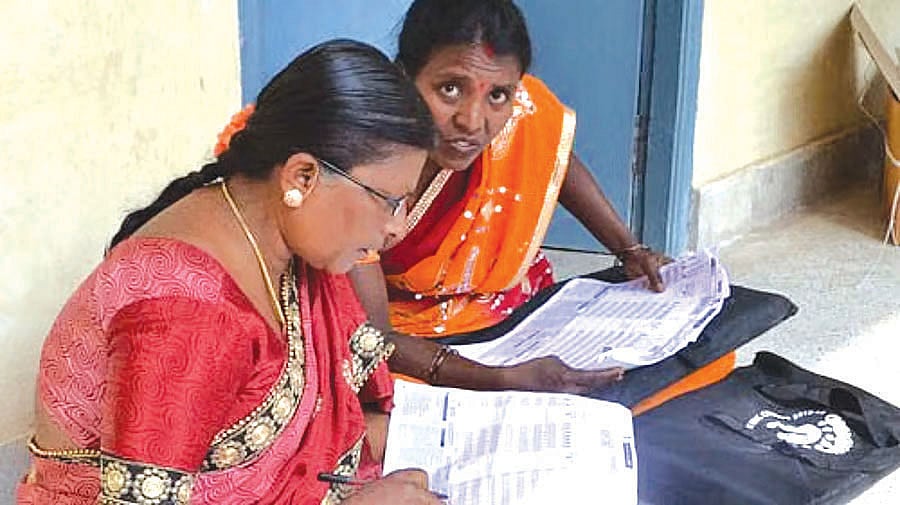Mr & Mrs Murt(h)y’s lessons for India’s unwashed masses
The couple’s grounds for not participating in the Karnataka caste survey gives away the nature of entrenched privilege

The socio-economic and educational survey being conducted by the Karnataka State Commission for Backward Classes, which got under way on 22 September and was to conclude on 31 October, has found some big-name critics. Author-educator-philanthropist Sudha Murty and her husband and Infosys co-founder Narayana Murthy were in the headlines for turning away the enumerators, reportedly with the words “we are not backward”.
The Murt(h)y couple’s grounds for not participating in the survey is a giveaway of the nature of entrenched privilege and the arrogance it frequently breeds. It also throws into relief the downside of our elite science and engineering education, which may build some domain expertise but remains disconnected from the grassroots of India and may even be contributing to widening social and economic inequities.
This worldview, which looks down on affirmative action as a waste of public funds, draws its keywords — ‘merit’, ‘efficiency’ and suchlike — from a dictionary of privilege. Their advocacy of a meritocratic order is often framed as a battle against the lazy looking for ‘freebies’. Maybe someday the penny will drop that to attain ‘merit’ takes ‘opportunity’, which India’s entrenched caste hierarchies and other forms of discrimination deny large swathes of the population.
Karnataka chief minister Siddaramaiah has reacted sharply to the Murt(h)y couple’s refusal to participate in the survey, fully cognizant of the power of celebrity endorsement or opposition. The chief minister said: “It needs to be understood that this survey is not meant only for backward communities … [that] they are from Infosys does not mean that they are all-knowing.”
The reverential awe that we Indians have for people who made it to some elite institutions (think: IIT/ IIM), or for some knowledge streams or businesses does need a reset.

Siddaramaiah is exactly on point: a degree from IIT/ IIM does not make you omniscient, nor does running a large company. In fact, value-free scientific or technical knowledge, it is well acknowledged, does more harm than good, disconnected as it is from issues of fairness, social justice and ethics.
It is instructive to recall the Enron collapse of 2001, the biggest US bankruptcy case till then. The company employed dozens of elite engineers and PhDs and hundreds of MBAs; it is these ‘smartest men in the room’ that accelerated Enron’s collapse.
The Murt(h)ys are, of course, within their rights not to disclose any information about their caste or economic status since participation in the survey is voluntary. But as software engineers who profited from early strides in Indian IT services, they will surely appreciate the significance of robust, current data in designing policies for and service delivery to sections of society classified as backward.
The Murt(h)y couple’s refusal to participate in the survey because they saw themselves beyond its scope has an air of disdain and by the same token a puffed-up sense of their own worth, of their station in life, of who they are and where they stand in the caste and class hierarchies.
As reported in several publications, Sudha Murty reportedly wrote on the survey form: ‘We do not belong to any backward community. Hence, we will not participate in a government-conducted survey meant for such groups (emphasis added).’ In other words, there is a world separating us from ‘such groups’.
The Murt(h)ys should know that the Centre, too, has agreed to do a caste enumeration with the next census, stating that this would demonstrate the Union government’s commitment “to the holistic interests and values of the nation and society”. Now, as chief minister Siddaramaiah asks, will the Murt(h)ys refuse to participate in the census exercise as well?
Also Read: Can UP crush caste assertion?
The implied charge against the caste survey is that it creates grounds for appeasement or ‘freebies’ as welfare measures. This deserves to be studied against plain facts because it is the current Union government that has preferred the policy of unconditional cash transfers (UCTs) over in-kind subsidies.
A recently released report (‘Unconditional Cash Transfers in India: Tracing the Journey, Shaping the Future’ by Project DEEP) argues how UCTs have become a tool to promote financial participation and inclusion of women by enabling access and removing barriers.
UCTs by the Union government have seen an eightfold increase in as many years: from Rs 8,560 crore in 2015–16 to Rs 70,860 crore in 2023–24. If we club central and state UCTs, the figure goes up to Rs 12,190 crore in 2015–16 and Rs 280,780 crore (up 23 times) in 2024–25 (Budget Estimates).
The report says there is consensus that ‘UCTs should not replace essential State functions but rather serve as strategic tools to enhance equity, reduce precarity and improve welfare access’.
The government must still invest in quality public goods like roads, schools and hospitals so that citizens can use the UCT money to enhance their lives, the report argues, adding the cautionary note: ‘UCTs should not be a band-aid against broken systems’.
This argument points to the complex nature of the task of development. The choice is not between supporting the weak and building services; both must work in tandem. Just as we need targeted welfare, we also need to drive maximum value out of every rupee of public funds. That means better execution and monitoring, in other words, better governance.
Better governance takes better data, and when the privileged and powerful get in the way of a data-gathering exercise, as the Murt(h)ys did in Karnataka, they end up sowing doubt, division and prejudice.
Jagdish Rattanani is a journalist and faculty member at SPJIMR. More of his writing may be found here
Article courtesy: The Billion Press
Follow us on: Facebook, Twitter, Google News, Instagram
Join our official telegram channel (@nationalherald) and stay updated with the latest headlines
